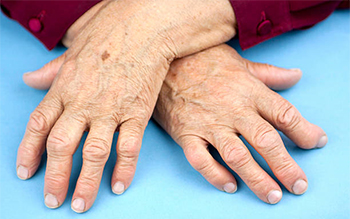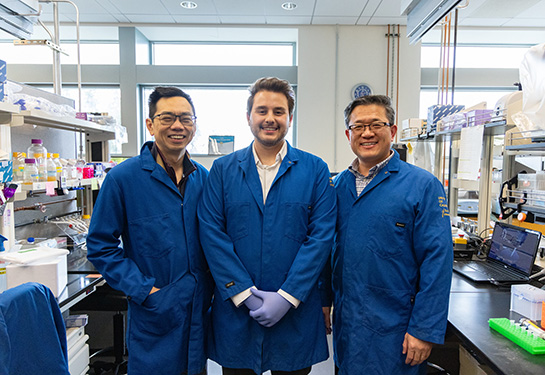Researchers discover potential new approach to treating psoriatic joint inflammation
An international team of researchers, led by UC Davis Health, has developed a new therapeutic approach to treating psoriatic arthritis, a chronic inflammatory disease affecting the joints.
Using a novel chemical blocker targeting chemokine proteins, the researchers were able to significantly reduce skin and joint inflammation in a mouse model with psoriasis and psoriatic arthritis.
What is psoriatic arthritis?
Psoriatic arthritis affects up to a third of patients with psoriasis, an auto-immune skin inflammation. It creates mobility and functional changes that make it painful for patients to use their hands or walk. Some of these changes are irreversible.

Psoriatic arthritis is tough to treat.
“There is a clear need for better treatments using alternative approaches to joint inflammation,” said Sam T. Hwang, professor and chair of dermatology at UC Davis and senior author of the study.
Understanding the mechanism behind joint inflammation
Chemokines are small molecules with a critical role in the body’s response to inflammation and infection. They help guide the migration of immune cells to the site of injury or trauma. Chemokines need receptors to function. One specific chemokine receptor is CCR6.
The researchers assessed the role of CCR6 and its binding partner CC chemokine ligand 20 (CCL20) in inflammation linked to psoriatic arthritis and psoriasis. They looked at the potential of the CCR6/CCL20 combo as an effective therapeutic target.
They measured the CCR6 and the CCL20 levels in the joint fluid and tendon tissues of patients with psoriatic arthritis. CCR6 is a critical agent for the migration of T cells – a type of white blood cells - in skin psoriasis. The new study showed that CCR6 plays a similar role in joint inflammation. The team also found that CCL20 is present at very high levels in inflamed joint fluid.
“We observed a significant increase of both CCR6 and CCL20 in the connective tissue of mice with psoriasis and psoriatic arthritis,” Hwang noted. “This high presence was also confirmed in inflamed human tendon biopsies.”
The presence of CCL20 at the site of the inflammation makes it a very attractive target for arthritis therapy.
The connective tissue linking tendons and ligaments with the bones is called the enthesis. It is an important site of inflammation in psoriatic arthritis. The study found that entheses are distinct locations which CCR6+ T cells appear to locate and, therefore, cause inflammation.
“It is critical to identify the specific tissues where inflammation in the joints first occurs before it spreads and damages the cartilage and the bone,” Hwang said.
Blocking the function of the CCR6 chemokine
The researchers tested the ability of a novel engineered protein- known as CCL20 locked dimer (CCL20LD)- in blocking the CCR6 function in a mouse model with psoriatic arthritis. The protein profoundly reduced both skin and joint inflammation by shutting the CCR6’s power to attract T cells.
“The success of CCL2OLD in blocking CCR6 function in a mouse model shows potential for treating psoriatic arthritis in humans,” Hwang said. “Definitely, this requires more testing and clinical trials to explore its effectiveness and safety.”
The study was published in the journal Arthritis & Rheumatology.
###
Co-authors on this study are Zhenrui Shi at University of California, Davis and Sun Yat-sen University, China; Neal Millar, Emma Garcia-Melchor, Flavia Sunzini and Moeed Akbar at the University of Glasgow; Xuesong Wu, Mimi Nguyen, Douglas Rowland, Machelle Wilson, Mindy Huynh and Timothy Law at the University of California, Davis; Anthony Getschman and Brian Volkman at the Medical College of Wisconsin; Smriti Kundu Raychaudhuri and Siba P. Raychaudhuri at the University of California School of Medicine, Davis, and VA Medical Center Sacramento.
This study was supported by a Pfizer ASPIRE award and the National Institute of Arthritis and Musculoskeletal and Skin Diseases (NIAMS) (ROI_AR063091_01A1), a Translational Research Grant from the National Psoriasis Foundation, a New Investigator award from the National Psoriasis Foundation, a Small Business Innovation Research grant (1R43AR074363-01), a grant from National Center for Advancing Translational Sciences (NCATS), National Institutes of Health (UL1 TR001860), a fellowship grant from Group for Research and Assessment of Psoriasis and Psoriatic Arthritis and a Medical Research Council, UK (MR/R020515/1). Hwang is a holder on the patent for CCL20LD and has an unpaid role as medical director at XLock Biosciences, which produces the protein.
Shi et al. (2021). Targeting the CCR6/CCL20 axis in entheseal and cutaneous Inflammation, Arthritis & Rheumatology, DOI:10.1002/art.41882.



